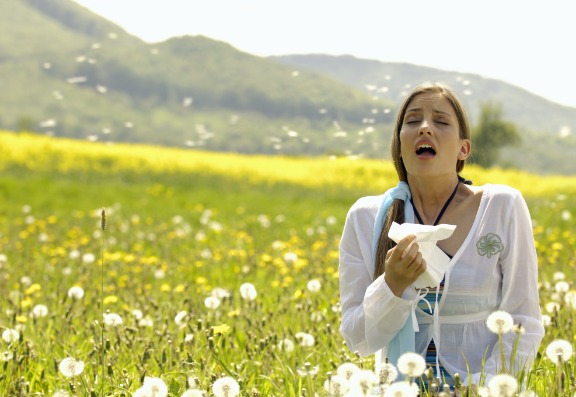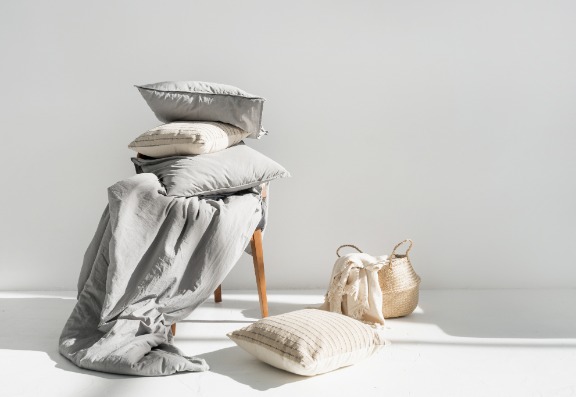After enduring months of harsh cold and central heating drying out our skin, the UK is now bracing for a pollen surge this April as pollen counts steadily rise each day.
Freezing temperatures, strong winds and indoor heating are a combination prone to drying out the skin because they disrupt the skin barrier.
However, as we are now heading into hayfever season, eczema flare-ups, itchy eyes, and runny noses are the next challenge.
A spokesperson for beauty and wellness marketplace, Fresha, says now is an excellent time to learn about how your skin can react to seasonal weather.
“Around 44 per cent of all British adults are impacted by allergies, and hay fever is one of the most common allergies, reportedly affecting up to 49 per cent of the UK population.
Grass pollen is the most common allergen, which normally is at its strongest from May to July. However, trees are mainly prone to causing the allergic reaction we know to be hay fever, at its strongest from February to June.
Allergies cause inflammation in the body, which can lead to swelling and skin irritation. When an allergen enters your system, the immune system overreacts and prompts the release of histamine, causing symptoms like sneezing, itchy eyes, and wheezing.
However, that reaction inside your body can impact your skin, and most of the time, skin conditions like eczema, psoriasis, and hives are likely to flare up at the same time your allergies do. This is because they are all connected to the immune system.
This flare-up will cause dryness, redness, irritation of the skin and sometimes puffiness around the eyes.”

To help you prepare for the month ahead, the experts at Fresha share their top tips on allergy-proofing your skin during the hayfever season.
Can you allergy-proof your skin?
Of course, you can allergy-proof your skin by reducing symptoms, but you need to do more than just take an antihistamine.
Keeping skin hydrated
Preventing dryness is key to reducing red, itchy, cracked symptoms. Therefore, moisturising at least twice daily, once in the morning and once at night, is recommended.
Depending on your skin type and sensitivity, if you suffer from skin conditions such as eczema (including contact and atopic dermatitis), psoriasis, or rosacea, you should avoid any products containing fragrance or alcohol.
Anything labelled with ethanol, isopropyl alcohol, and alcohol denat is ultra-drying for the skin.
Normally, the ingredients that are at the beginning of the label indicate the main ingredients the product is made up of. For example, e45’s main ingredient is white soft paraffin, which helps soften dry skin and soothe sores, lesions, and psoriatic scaling.
Also, try to opt for products with fewer active ingredients.
The National Eczema Association recommends you look for moisturising lotions containing these substances:
- Water
- Oat or shea butter
- Aloe
- Glycerin
- Hyaluronic acid
- Petrolatum
- Vitamin E
- Humectants
- Niacinamide
Cleansing is key
Cleansing your skin is extra important during allergy season, and you should do it in the morning and at night.
This is because you need to get rid of any pollen particles that could have landed on your face or body.
However, over-cleansing can dry your skin out, especially for those with dry, sensitive skin. Therefore, it is important to cleanse the right way and pick your cleanser wisely.
Ideally, you want a mild, gentle cleanser with no harsh chemicals. CeraVe and Cetaphil have some great options and also La Roche Posay.
Also, avoid cleansing with piping hot water, as this doesn't just strip your skin of natural oils but can also damage or burst capillaries.
Alex Sena, CEO & Medical Practitioner of Our Skin Clinic adds,
“If you don’t have a suitable cleanser, don't moisturise or use skin protection you leave your skin exposed to free radicals, like UVA rays and pollen.
Your skin’s immunity is then going to be naturally low and the side effects will be much greater compared to those people who have the same condition but have prepared themselves beforehand.”
Wash your bedding and clothes regularly and dry them indoors
Pollen sticks to your clothes easily and can easily be transferred to your skin and bedding. Therefore, washing them very regularly will help to avoid contact.
Also, during this time of year, it is recommended you wear non-abrasive fabrics that are gentle on your sensitive skin.
Avoid synthetic materials and stick with skin-friendly materials such as 100 per cent cotton, linen, bamboo or silk.
Also, dry your clothes and bedding indoors rather than outdoors, where pollen particles are more likely to make a home in your laundry.

Try not to stress
Sometimes, it's easier said than done, but stress is one of the biggest triggers of skin problems.
When stressed, your body releases 'stress hormones', such as adrenaline and cortisol. These hormones impact different bodily functions, including the flow of blood to your skin.
Typically, a common sign of stress is skin irritation or a rash. Therefore, to prevent skin problems, try to do stress-relieving activities such as yoga, meditation, reading, listening to music or socialising with friends.
What to do if your skin flares up?
If your skin does become inflamed, try the following treatments:
Step 1- Antihistamine
If you haven’t already, taking an antihistamine is recommended. As it says in the name, antihistamine helps to decrease your body's natural production of histamine, which occurs when an allergen comes into contact.
Antihistamines, such as fexofenadine and diphenhydramine, can help relieve itching and are a standard treatment for hives. The majority of antihistamines can be bought over the counter.
Step 2- Cooling compress
For red, itchy and inflamed skin, try to cool it by applying either a cold flannel, aloe vera or calamine lotion.
If none of these work, try a colloidal oatmeal bath. Research has shown oatmeal baths can have potent anti-inflammatory, anti-itch, and antioxidant benefits for the skin, and the only thing you need is colloidal oatmeal.
Step 3- Topical steroid creams
If the skin is still inflamed, over-the-counter products such as hydrocortisone, desonide and clobetasol creams are most commonly used to treat eczema and allergic contact dermatitis.
All topical steroids should be used sparingly on your face, which is normally the most sensitive part of the body, and avoid applying around the delicate parts of your eyes.
Step 4 - Allergen avoidance
For further flare-ups, if you know for sure you have specific allergies, avoid them, as this could significantly reduce your hay fever symptoms.
If you suspect you have more allergies apart from hay fever, you should go for allergy testing with your local GP.
Hey, wait!
Before you go.....
Let's stay in touch, pop your details here and we'll send our editor's hand-picked updates on your fave subjects.